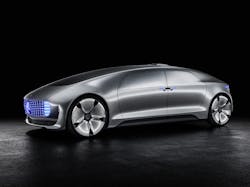The future of mobility and its impact on trucking
How we get around our cities and move our goods is starting to undergo a fundamental change as new technologies and social trends transform how people live and travel, according to a new report issued by consulting firm Deloitte LLP.
"While no one knows precisely how we will live and move about in the future, one thing is clear – we are beginning to experience a wave of innovations that can fundamentally alter daily life,” Cathy Engelbert, CEO of Deloitte LLP in the U.S., noted in the report. “As cities become smarter and mobility becomes ‘frictionless,’ the future is here."
The question, then, is what does such a “future” portend in terms of change to the trucking industry as we know it today?
As cities get bigger and more people rely on e-commerce to acquire all manner of foodstuffs and consumer goods, will different kinds of trucks be required?
Will the demand for more “sustainable transport” drive a shift to new truck propulsion systems? Trucks that offer fundamentally different operating parameters compared to present and past models?
Deloitte’s report, for one, highlights ways in which “industry lines” are blurring and "coopetition" is increasingly becoming the new norm, noted Scott Corwin, managing director of Deloitte Consulting LLP and leader of the firm’s future of mobility practice.
"While industry incumbents and disruptors are making significant moves to shape the future, both sets of players realize that collaboration is the surest path to a value-added role within the ecosystem,” he explained.
“A critical first step is understanding what specific roles a company might play, and what capabilities will be required to succeed.”
Here are some of the “future mobility” possibilities Deloitte foresees:
- The rise of mobility as a service, which will reshape how urbanites get around: In so-called “forward-looking” cities like Helsinki, Paris, Eindhoven, Gothenburg, Montpellier, Vienna, Hanover, Las Vegas, Los Angeles, Denver, Singapore and Barcelona, Deloitte said mobility as a service (MaaS) is emerging as the next revolution in urban travel. MaaS relies on a digital platform that integrates end-to-end trip planning and payments. “By answering the question of how best to get individual users where they're going based on real-time conditions and their own preferences, MaaS starts to move us toward a more user-centered mobility paradigm,” said Corwin. “As governments and business leaders look to reshape the way urbanites get around, there are lessons that can be learned from markets around the globe — and there are specific actions that leaders can take to realize the tremendous benefits of MaaS.”
- Making cities smarter by tapping the “collective intelligence” of their citizenry: Optimizing physical infrastructure is only part of the smart city story. “City planners now have access to a host of new tools that can help them tap the collective wisdom of the citizenry to make better decisions,” Corwin noted. “Data science, behavioral science and digital technologies can give voice to more constituents and help leaders to make their cities not only more efficient, but also better places to live.”
- Autonomous driving and the need to win the trust of American consumers: Deloitte surveyed more than 22,000 consumers in 17 countries and found: U.S. consumer interest in advanced vehicle automation has increased, especially among younger generations; however, willingness to pay for these technologies has decreased. The survey also found consumers' preferences vary substantially when looked at through generational and geographic lenses.
"Over a year ago we asserted that the extended global auto industry was undergoing an unprecedented transformation to become a completely new mobility ecosystem," added Corwin. "Since then, the pace of change has been nothing short of breathtaking.”
That it’s been. But at some point we’ll need to pause to catch our collective technological breath. And when we do, will we decide to continue down these many and different “mobility paths” or will we reassess our options? We’ll find out sooner rather than later I think.
